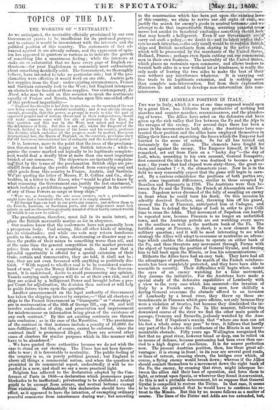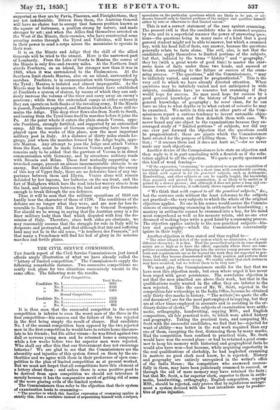. THE AUSTRIAN POSITION IN ITALY, ,
THE war in Italy, which it was at one time supposed would open. by a great blow, has hitherto been productive of nothing but marches and counter-marches, reconnaissances, and the plunder- ing of towns. The Allies have acted on the defensive and have- given up the rich valley that lies between the Po and the Alps to the ravages of the enemy. For several days there has been a pollee in the movements on both sides ; the Austrians have con- tracted their position and the allies have employed themselves in filling their lines and organizing the forces which the Emperor had hurried to the scene of action. - So far all had turned out fortunately for the Allies. The elements have fought for, them and against the enemy. The Emperor himself, it-will be, remarked, set out from Paris on a " lucky day "—the day of- Lodi, when, according to his own account, General Bonaparte, first conceived the idea that he was destined to become a great man ; the years that had elapsed were sixty-three the great as- trological number 7 x 9, the climacteric year. Now he is in the field we may reasonably expect that the game will begin in earn- est. By a curious coincidence the positions of both parties are,' with some important differences, similar to those occupied by Beaulieu and Bonaparte in 1796. The Austrians were then be- tween tween the Po and the Ticino, the French at Alessandria and Tor- tona. Napoleon never dreamed of the folly of assailing an enemy in front when he could turn his flank. On this occasion he adroitly deceived Beaulieu, and, throwing him off his guard, crossed. the Po at Piacenza, anticipated him at Cadogna, and forced him to defend the bridge of- Lodi in order to give Colli time to cross the Adda. That movement of Napoleon can hardly be repeated now, because Piacenza is no longer an unfortifled town, and the Austrian patrols are out watching every move' on the southern as well as the northern bank of the Po. The fortified camp at Piacenza, in short, is a new element in the military question; and it ;till be most interesting to see what strategy the Allies will adopt to overcome or neutralize an advan- tage which enables the Austrians- to operate on either bank of the Po, and thus threatens any movement through Parma with the object of turning the position of General Gyulai, and forcing- him to fall back upon the Mincio, or lose, his communications:- Hitherto the Allies have had an easy task. They have had all the advantages of position. The march of the French reinforce- ments has been completely protected, and they have been able to assemble in security. Their difficulties will begin when, under the eyes of an enemy watching for a false movement,' they assume the initiative. For the Austrians have made a special study of the defensive capabilities of Lombardy with a view to the very case which has occurred—the invasion of Italy by a French army. Having seen how skilfully. a daring General overcame the obstacle offered to an invasion of Lombardy by a broad river, they threw up those en- trenchments' at Piacenza which gave offence, notonly because they were a violation of treaties, but because tey diminished the in- security of the line of the Po. In like inanne:r---;"following the downward course of the river we 'find the other main points of passage, Cremona and Brescello, jealously watched by the Aus- trians. But if Napoleon's maxim that "where one man can set his foot a whole army may pass" be true, it follows that hardly any part of the Po above the confluence of the Mincio is an insur- mountable obstacle. Fifty years ago Wellington recognized the fact that no great river, however broad or deep, can be relied on as means of defence, because pontooning had been even then car- ried to a high degree of excellence. It is far nearer perfection now. The present Austrian position, then, has these great ad- vantages: it is strong in front ; in its rear are several good roads, or lines of retreat, crossing rivers, the bridges over which, of course, a flying enemy would break down ; Whereas if the Allies should commit themselves to a movement down the right bank of the Po, the enemy, by crossing that river, might interpose be- tween the allies and their base of operation, and force them to fight, or retreat upon Spezia, or wherever they found it convenient. As this is not -a probable denouement, let us suppose that General Gyulai is compelled to recross the Ticino. In that case, it seems to be taken for granted that he would have to continue his re- treat to the Mimeo. But this by no means follows as a matter of course. The lineaof the Ticino and Adda are too extended, but, supported as they are by Pavia, Piacenza, and Pizzighiettone, they are not indefensible. Driven from them, the Austrian General will have no choice but to occupy that famous position known as the square of fortresses, a position strong, by nature, and made stronger by art ; and when the Allies find themselves arrested on the West of the Mincio, their enemies, who have constructed some amazing routes through the Tyrol. and Valteline, will have it in their power to send a corps across the mountains to operate in
their rear. ' - It is on the Mincio and Adige that the skill of the allied Generals will be tried to the utmost. Here is the narrowest part of Lombardy. From the Lake of Garda to Mantua the course of the Mind° is only five-and-twenty miles. At the Northern limit stands Pesehiera, on an island, far stronger now than it was in 1848, when it was snriendered to the Piedmontese. At the Southern limit stands Mantua, also on an island, surrounded by marshes. Peschiera is in communication with Germany through the Tyrol ; Mantua is isolated and almost impregnable. As the Mincio may be forded in summer, the Austrians have established at Peschiera a system of sluices, by means of which they can sud- denly increase the volume of the river and carry away an enemy's pontoons ; while from the entrenched camps at either extremity they can operate on both flanks of the invading army. If the Mincio is passed, Peschiera captured, and Mantua blockaded, there still re- mains the Adige. This deep river flows also from North to South, and issuing from the Tyrol loses itself in marshes before it joins the Po. At the point where it enters the plain stands Verona, oppo- site Peschiera, strongly fortified, and supported by an entrenched camp. All the resources of German engineering have been dis- played- upon the works of this place, now the most important military post in Italy. At a distance of thirty miles stands Le- gnago, just where the marshes formed by the Adige begin, oppo- site Mantua. Any attempt to pass the Adige and attack Verona from the East, must be made between Verona and Legnago. It remains only to be added that the garrison of Verona is in direct communication with Germany, and by circuitous military roads with Brescia and Milan. These four mutually supporting en- trenched camps, present an almost insurmountable obstacle to an enemy. But should the Allies succeed in dispossessing the enemy of this key of Upper Italy, there are no defensive lines of any im- portance 'between them and Illyria. Venice alone will remain defended by her lagoons, her batteries on the sea front, and the fort of Malaghera which bars the road into her watery streets from the land, and interposes between the land and any force fortunate enough to break through the sea defences. Thus it will be seen that the military operations of 1859 can hardly bear the character of those of 1796. The conditions of the defence are no longer what they were, and are now far less fa- vourable to Napoleon III than formerly to General Bonaparte. Nor should we be wrong in saying that the Austrian army is a far finer military body than that which disputed with him the do- minion of Italy. Therefore, since both sides are obstinate we may reasonably assume that the struggle for rule in Italy will be desperate and protracted, and that although that fair and suffering land may not be in the old sense, "le tombeau des Francais," yet that many a Frenchmen will find his bed of glory in its noisome marshes and fertile plains.



























 Previous page
Previous page